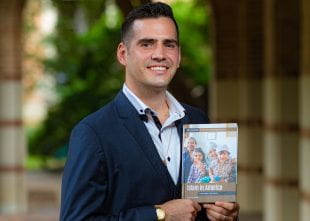What did Muhammad, the prophet of Islam, think about freedom of religion and women’s rights? Did the likes of George Washington and Thomas Jefferson imagine Muslims as future citizens of the United States? What is it really like to be a follower of the Islamic faith in the U.S.? A new, first-of-its-kind book from a Rice University sociologist answers these questions and more.
“Islam in America: Exploring the Issues” (ABC-CLIO, 219 pages, $40) takes an honest and positive look at the Islamic faith and its followers living in the U.S. Craig Considine, a sociology lecturer at Rice and the book’s author, challenges the “clash of civilizations” theory by dispelling common misconceptions about Muhammad, the Islamic tradition and American Muslims. He focuses instead on the “dialogue among civilizations” to show the historical and present-day connections between the “Muslim world” and the U.S.
“First and foremost, this book tries to synthesize American values and Islamic values,” Considine said. “It’s unfortunate that there are people in the U.S. who view Islamic values and civilization as polar opposites of our own, and it’s also not really true.”
The book examines the rich diversity of Muslims living throughout the country — including Arab, European, Latin, African and Asian followers — and separates fact from fiction regarding Islamic traditions. Considine also tackles more controversial issues in the book, diving into apostasy, jihad, sharia and Islamophobia.
“The entirety of the ummah, or the world’s Muslim population, is represented in the United States, a country that provides freedom of religion, freedom of speech, freedom of conscience and equal rights as outlined in the U.S. Constitution,” Considine said. “Many people may be surprised to hear it, but Muhammad worked to protect these same human rights over 1,000 years before the United States even existed.”
Considine said the ultimate goal of the book is to bridge the gap between Muslims and other individuals living in the United States, and promote peace and acceptance through understanding. He expects it will be used to teach undergraduate students at the college level but hopes religious leaders, politicians, media figures and others will read the book, which he describes as “an encyclopedia of different hot-button issues” related to Islam.
“The pluralist vision of Muhammad and the U.S. Founding Fathers is where future generations of this country must turn,” Considine said. “‘We hold these truths to be self-evident, that all (people) are created equal.’ These universal and timeless words capture the best of ‘American values.’ They also capture the best of the Islamic tradition.”
More information on the book is available at https://www.abc-clio.com/ABC-CLIOCorporate/product.aspx?pc=A5866C.


